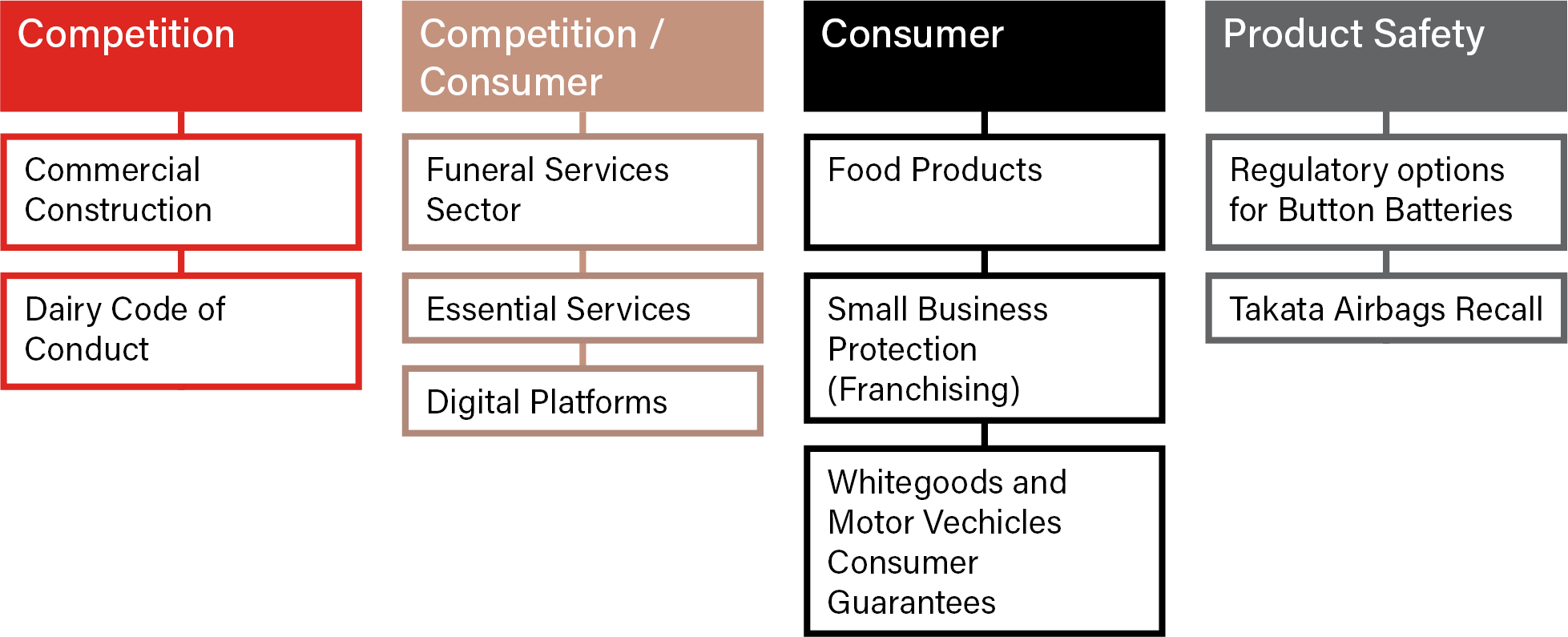
Publication
Insurance regulation in Asia Pacific
Ten things to know about insurance regulation in 19 countries.


Australia | Publication | March 2020
The Australian Competition and Consumer Commission has released its Compliance and Enforcement Policy for 2020.
The ACCC is focussing upon a variety of industries and behaviours this year, as summarised below.

The priority areas complement a set of enduring priorities, identified as ongoing behaviours that harm Australians. The enduring priorities include cartel and anticompetitive conduct, product safety, and the recognition that vulnerable consumers and indigenous Australians can be disproportionally impacted by conduct in beach of the Competition and Consumer Act.
ACCC Chair Rod Sims has stressed that the ACCC is driven by a fundamental belief in markets and only intervening if it is justified in the circumstances. Whilst the ACCC has limited resources and must target its work on identified priority areas, its budget and powers have been increasing year on year and its track record in taking cases in the stated enforcement focus areas is established. As such, we anticipate real action on these matters in 2020.
Funeral Services Sector – the ACCC aims to improve its understanding of the market and undertake targeted action. The ACCC’s view is the funeral industry has long been plagued by customer complaints from the public and government. The ACCC has identified that some players have significant market power who bundle services and block new entrants to the market. There are also allegations of misleading and deceptive practices including hidden fees, add-on services and misrepresentations about inclusions, and unfair contract terms within funeral service and pre-paid funeral contacts.
Digital Platforms – the ACCC continues to focus on the transparency of data practices and the adequacy of disclosure to consumers. Following the release of the Digital Platforms Inquiry Final Report, the Federal Government has funded a Digital Platforms Branch at the ACCC to ensure proactive scrutiny of the sector. Follow up inquires in digital platform services and digital advertising services have also just been announced.
Pricing and Selling Practices of Essential Services – competition and consumer issues arising from complex pricing of essential services will continue to be a focus, especially in the energy and telecommunications sectors. Anti-competitive conduct and failures to pass through cost reductions will be targeted through the Federal Government’s new energy market misconduct laws.
Misleading Claims in Food Marketing – in response to calls from consumers to do so, the ACCC is focusing on food products that make misleading claims about the health and nutritional content of foods that have the capacity to cause substantial consumer detriment.
Commercial Construction – anti-competitive conduct and unfair business practices within commercial construction markets will continue to be a focus of the ACCC. This aligns with the ACCC’s priorities due to the tendency for this sector to be concentrated and the high value opportunities that may be influenced by any wrongdoing.
Small Business – the ACCC will continue to consider the protections afforded to small businesses. The ACCC observed that the recent Parliamentary inquiry into the franchising sector has raised concerns about some questionable industry practices. It plans to bring cases this year which it believes will highlight some of the significant problems in this sector.
Dairy – the Dairy Industry Code came into effect on 1 January 2020. The Code requires dairy processors to publish and use standard form milk supply agreements to provide a fairer process for negotiating contracts with dairy farmers. The ACCC will work closely with the affected dairy farmers to ensure smooth implementation of the Code. The ACCC will also enforce the code where significant non-compliance issues arise and review the Code’s impact after a 12 month period.
Consumer Guarantees – the ACCC has identified consumer guarantees as the number one issue for the ACCC, with complaints to the ACCC being very high particularly in the motor vehicle and white goods sector.
Button Batteries – last year the ACCC established the Button Batteries Taskforce to review whether industry actions successfully mitigate the risks posed to children by button batteries, and to consider what regulatory options are available. Options being considered by the Taskforce include requirements for secure battery compartments on products containing button batteries, child resistant packaging and warnings. The Draft Recommendation will be released for public comment in the first half of 2020.
Takata Airbags Recall – the ACCC will finalise the Takata Airbags recall, the largest ever recall undertaken in Australia.
Cartel Conduct – there are currently 5 criminal cartel cases before the courts, including two which relate to the financial sector, underpinning this enduring priority. Additionally, the ACCC has revised the cartel immunity and cooperation policy which includes a new anonymous hotline for whistle-blowers, which the ACCC reports has resulted in a small number of active investigations. See our 2019 Spring Update here for more details on these cases.
Misuse of Market Power – the ACCC will use injunctions to aid more efficiency in its approach to anti-competitive conduct investigations. The ACCC expects there to be at least 4 new competition cases instituted during 2020.
Market Studies – the ACCC has bourn a heavy load of market studies. The ACCC acknowledges that market studies provide the foundation for enforcement and compliance work and is expected to release final reports on the inquiries into the Murray-Darling Basin water markets, and the Northern Australia insurance industry in 2020.
2020 is shaping up to be a busy year for the ACCC, with a number of high profile cases commenced or to be commenced, numerous market studies and a focus on regulatory change. We will be watching these activities closely and will update you during the year on important developments.

Publication
Ten things to know about insurance regulation in 19 countries.

Publication
On November 28, 2023, the European Commission (EC) adopted its first list of Projects of Common Interest (PCIs), i.e., projects within the EU territory, and Projects of Mutual Interest (PMIs), i.e., projects connecting the EU with other countries, including 166 projects implementing the European Green Deal.
Subscribe and stay up to date with the latest legal news, information and events . . .
© Norton Rose Fulbright LLP 2025